Alex Jones in Her Courtroom Is the Least Interesting Thing About Judge Maya Guerra Gamble
By Samantha Eisenmenger
Reporting Texas
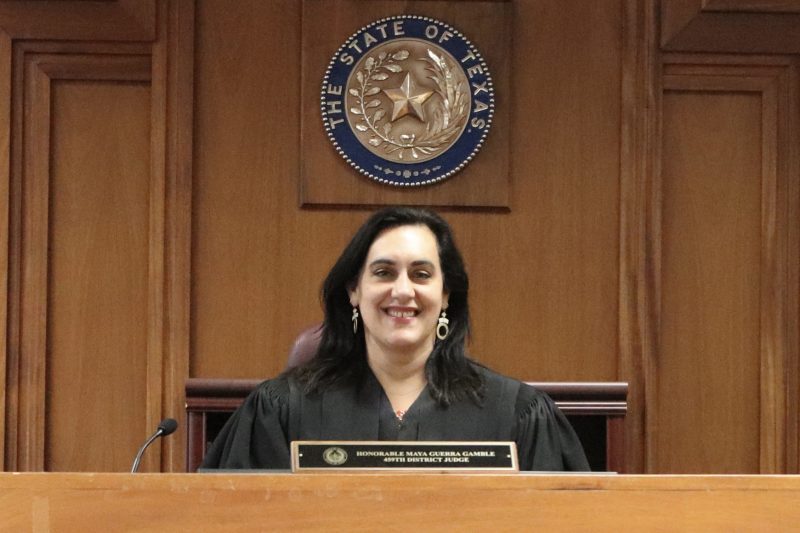
Judge Maya Guerra Gamble sits on the bench in her fifth-floor courtroom at the Heman Marion Sweatt Travis County Courthouse in Austin, Texas, on Oct. 26, 2022. Samantha Eisenmenger/Reporting Texas
The world came to know Maya Guerra Gamble last summer as the no-nonsense judge presiding over the Texas defamation trial of Austin-based conspiracy theorist Alex Jones and his Infowars media company.
“It seems absurd to instruct you, again, that you must tell the truth while you testify,” the Travis County district court judge lectured Jones at one point. “But here I am. You must tell the truth while you testify. This is not your show. You need to slow down and not take what you see as opportunities to further the message you’re wanting to further.”
The trial resulted in a $49 million in August against Jones and Infowars for harming parents of one of the 20 children killed in the Sandy Hook Elementary mass shooting in 2014. Jones had claimed that the mass shooting was a “hoax” and the families of the children were “crisis actors.”
In November, Gamble was presiding over the case again, ruling that Infowars must pay the full verdict amount and questioning the constitutionality of a Texas law that would have limited the judgment to far less.
“This person and this company have done something horrible,” Gamble said then.
Speaking directly is a trademark of Gamble’s personality. “I’ve always been a pretty direct person. … And in both directions. I have never enjoyed false praise. I would rather hear the truth. Whatever it is,” Gamble said.
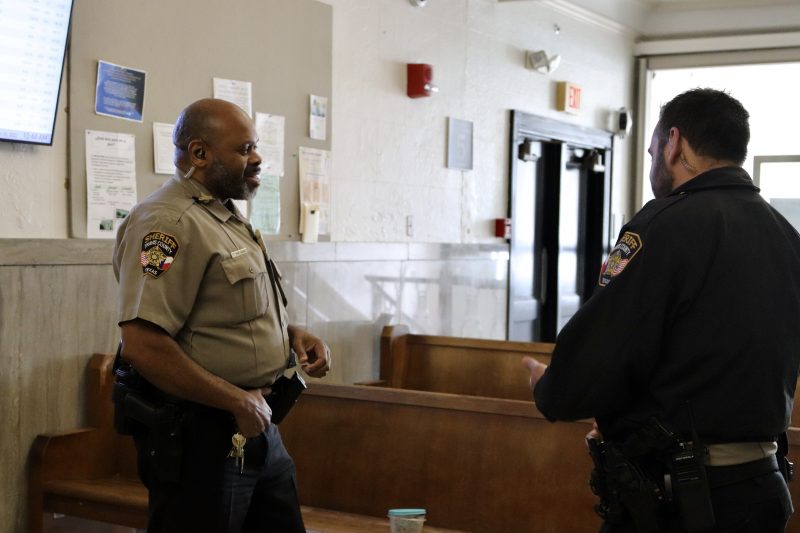
Travis County Sheriff Deputies Trent Roe, left, and Joshua Eisman talk during a break at the Travis County Courthouse where Gamble presides. Her courtroom has seen an increase in threats as a result of some high profile cases assigned to the judge. Samantha Eisenmenger/Reporting Texas
But the Jones trial isn’t the only high-profile case to put Gamble’s courtroom under an international spotlight, resulting in an increased number of threats and harassment.
In September 2021, Gamble granted Planned Parenthood a temporary restraining order against anti-abortion group Texas Right to Life. The order temporarily blocked the group from using the new Texas abortion law that allows private citizens to sue anyone who “aids or abets” an abortion after six weeks.
“The decision to grant a temporary restraining order related to the abortion law got a lot of attention across the world,” Gamble recalled.
As a result, she said, she has received “a lot of negative comments and communications. Extremely negative, extremely racist, sexist, size-ist” comments on social media, email and phone calls. Gamble forwards those negative communications to the sheriff’s office for review.
“There have been a handful where I have said, ‘I need you to find out who this is.’ And a few where I’ve said ‘I need you to try and call them and see what they say.’ Whether because they said something more than ‘you’re going to hell when you die’ or they said something like ‘I wish I could be the one to send you there,’” said Gamble.
Some of the harassment has bordered on what Gamble described as obsession. On a couple of occasions she’s received, from one person, “maybe 100 messages in one day. …To me, what that feels like is a mentally ill person. And that feels unpredictable, and a little more dangerous. Most of the time, they don’t even live in Texas. And so, I worry less. But we did put in a security system in our house.”
“I try not to worry about it. I like to believe the vast majority of people would not say any of those things to my face.” With a grin, Gamble quips, “The internet. Is not all good.”
Prior to becoming a judge, Gamble represented parents and children in child protective services cases; served as an assistant attorney general, where she prosecuted child pornography and child exploitation cases; represented whistleblowers at O’Connell & Soifer, LLP.; and began her career at the U.S. Department of Justice in the honors program as a trial attorney, where she handled major fraud cases.
When Gamble decided to run for civil court district judge, she sought advice from a former colleague who now serves as a judge, Jan Soifer.
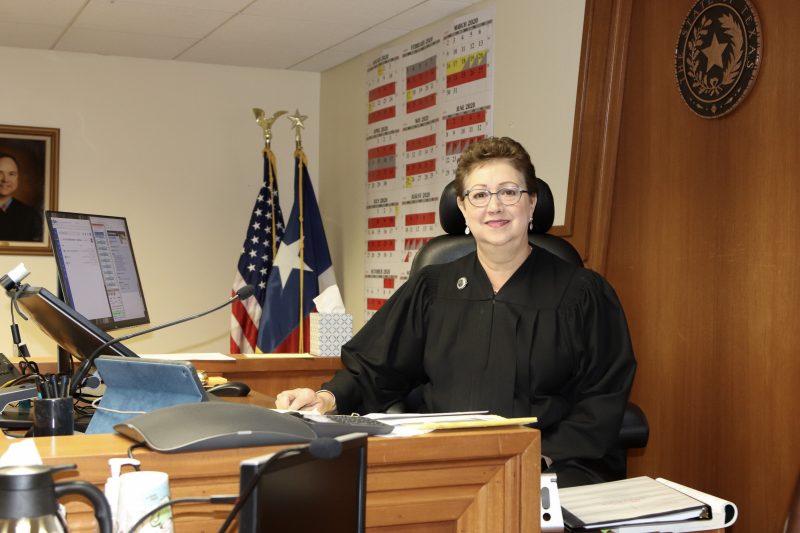
Judge Jan Soifer, who Gamble consulted before deciding to run for judge, sits on the bench in her fifth-floor courtroom at the Heman Marion Sweatt Travis County Courthouse in Austin, Texas, on Nov. 14, 2022. Samantha Eisenmenger/Reporting Texas
“I told her I thought she’d be a great judge, but I wanted to make sure she knew what she was getting into. Because running is really hard! So, we had a conversation. She and I talked about that recently. And she said, ‘All I remember of that conversation is that you told me you thought I could do it.’ And I just laughed, because what I remember of that conversation was telling her how hard it was,” Soifer said.
In May 2018, Gamble narrowly won the Democratic nomination in a primary runoff against Associate Judge Aurora Martinez Jones. Gamble would later run unopposed in the general election and win the Texas 459th District Court seat. In the November election, Gamble ran unopposed and won another four year term.
“She has all of the qualities you want to see in a judge. She’s really smart. She’s really thoughtful. She tries to get every decision right. And she has a great sense of humor and a great perspective on things,” said Soifer.
The late Bill Powers, who was a law professor and UT president, also had thought Gamble would make a good judge and endorsed her campaign in 2018. Powers said at the time, “She is compassionate, cares about doing the right thing. I’ll bet every lawyer that goes into her court will say, ‘I had a fair shake.’”
Gamble said she enjoyed campaigning, “It was fun. I love meeting people and talking to people.”
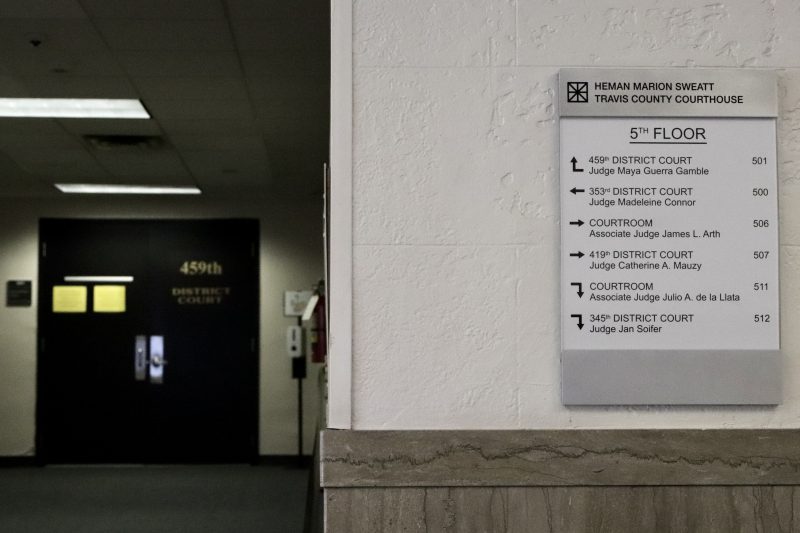
A sign directs visitors to Judge Maya Gamble’s courtroom on the fifth floor at the Travis County Courthouse in Austin, Texas. Samantha Eisenmenger/Reporting Texas
“Actually one of the hardest transitions to this job, for me …was not doing any talking. I just listen. …and I get very little talking opportunity. Those were hard transitions for somebody who had been one of the lawyers for 20 plus years.”
Gamble describes a funny interaction during her first month on the bench, while listening to attorneys try their case, she said, “Objection! And the lawyer who should have objected, goes, ‘objection?’ And the lawyer to whom I had objected, goes, ‘I think I know what the ruling will be’ and I was like, ‘yes, you do. Sustained.’”
A native Austinite, then known as Maya Guerra, she would spend hours in the Manchaca Road Branch Library when she was growing up. Their East Austin home did not have air conditioning, so the library was a refuge from the heat. She loved to read. Her goal was to read every book in the children’s section. “I would go with my grocery bag and just take every book on the shelf. No selection. Just every book, to check them out.”=
Gamble credits her mother for her love of reading. Her mother’s philosophy was that “once a person learns how to read, you cannot tell them what they can or cannot read anymore. So even if you’re 6, if you want to read a book, and you can read it, you get to read it.” The untraditional approach instilled a certain independence and confidence in her from an early age.
“I’ve always wanted to be useful. I think that’s really important. I mean, I have had such a lucky upbringing.” Her father, originally from Mexico, emigrated to the United States as a child. Her mother was born in Waco.
“They met in college here in Austin. They made choices, or had experiences, that left us as a family, very poor.” Gamble describes how grateful she was to have received school lunches, prescription glasses and vaccines that were “the things that you get for free, because you need them, desperately.”
Gamble attended Austin public schools and remembers her time there fondly. One of her favorite teachers at Austin High School was Leyla Cohlmia who taught AP Chemistry. “No nonsense, direct, truthful style. …Even as a teenager, she talked to all of us teenagers the way she would talk to any person. Which I really enjoyed and liked. I feel like that’s really important.”
Equality has always been important to Gamble. Treating people fairly, and being treated fairly is a guiding force in her life and career. Gamble has experienced living in a low-income area of east Austin and she then experienced attending an elite ivy league university, Yale.
Gamble recalls saving her own money for a trip to New Haven, Connecticut, to visit Yale University for a college visit when she was deciding where to apply. During her visit, she spoke with a Yale student and recalls asking, “How do you pay for college? And she goes, ‘Well, my dad writes a check.’ I was like, ‘Oh, I don’t know if I fit in here.’” She later spoke with other students whose experiences were more like her own and found a place for herself, graduating from Yale with a degree in psychology.
Gamble said she recalls “people making assumptions about me, based on that degree, about where I came from.” She applied to work for a legislator who told her that he would love to offer her the job, but a lot of his “constituents live in neighborhoods where people park in the yards.” He wondered if she would be able to relate to them. Gamble was surprised by the assumption he made about her background and responded, “I was like, yeah. Because I grew up in Montopolis. I think I will.”
Gamble is full of surprises, her original career path was to be a midwife. And in a circuitous way, midwifery led her to law school because she struggled with what she perceived as a disrespect from the medical community towards the midwifery profession.
“And so I thought I’m gonna go to law school and then I can help people in a whole bunch of different ways. And that’s really what I’ve tried to do with my whole career is things that were helpful, in general, to people,” said Gamble.
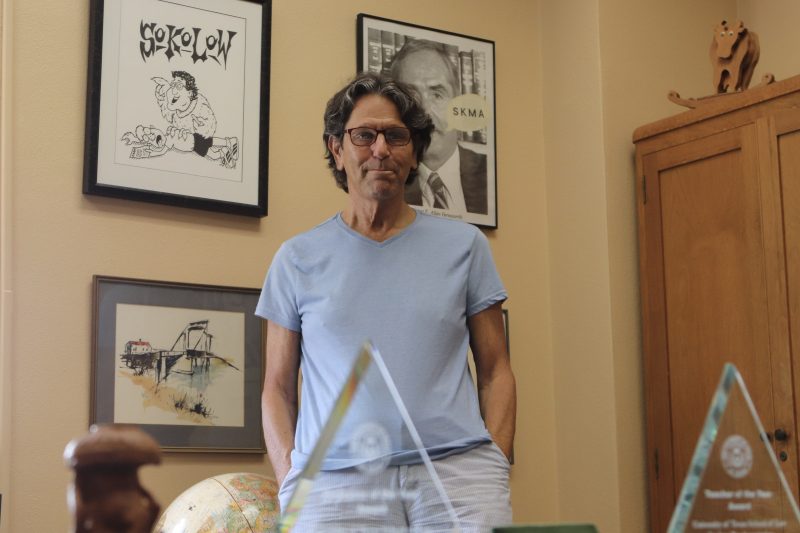
David Sokolow, law professor at the University of Texas, remembers Gamble when she was a first-year UT law student. Samantha Eisenmenger/Reporting Texas
University of Texas law professor David Sokolow remembers Gamble as a first-year law student who stood out from her peers. “I think three students, over my 42-year history at UT, who transferred from UT to Yale Law School. And Yale’s number one law school in the country, it has been forever.” But it wasn’t just her intelligence that made her stand out, “One of the things that’s so memorable about Maya is that she always had a wonderful sense of humor. She always had a twinkle in her eye. …Even when she was talking about contracts or law school. It’s clear she was really enjoying her experience here,” recalled Sokolow.
Sokolow described some students as being nervous and unable to articulate their questions, but that was not Gamble’s personality. “She was very direct and to the point, and that’s so much better than somebody slinking in and being intimidated.”
The drive for equality for herself and others, led her to attend law school so that she could fight for those who did not have a voice. All of this eventually led her to becoming a judge.
While people like Alex Jones may generate press about her courtroom, her daily work is much different.
Gamble, 53, is married with two sons. When she’s not in court, she enjoys knitting and is still a voracious reader. She said she had read 169 books so far this year.
Gamble said she brings that broad scope of experience and perspective to the bench, and she can approach her work with the lived-experience that many of her constituents in Travis County have had.
“It was something I talked about a lot when I was running for this position, like Travis County has all kinds. And it’s, it would be a good thing to have somebody in this seat, who actually has lived some of those experiences a little bit broader than the majority, or all, of our judges really lived.”